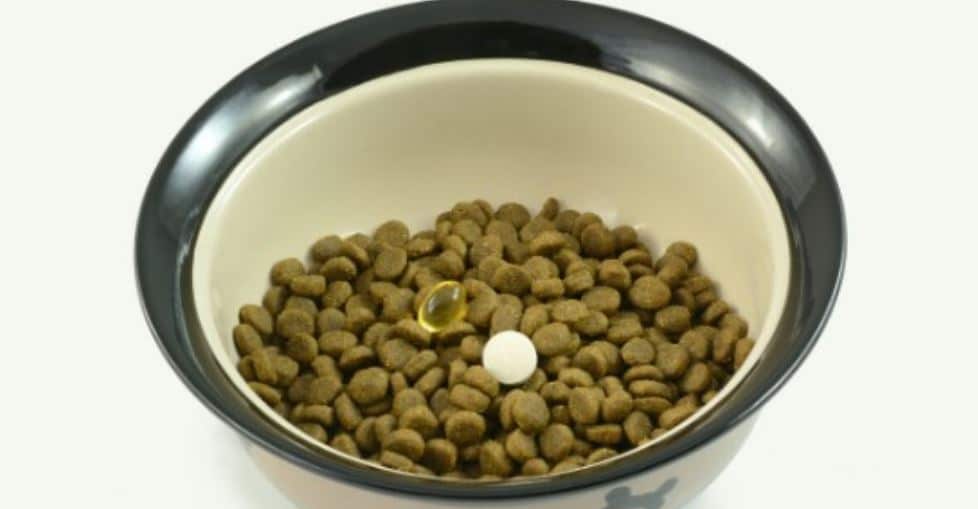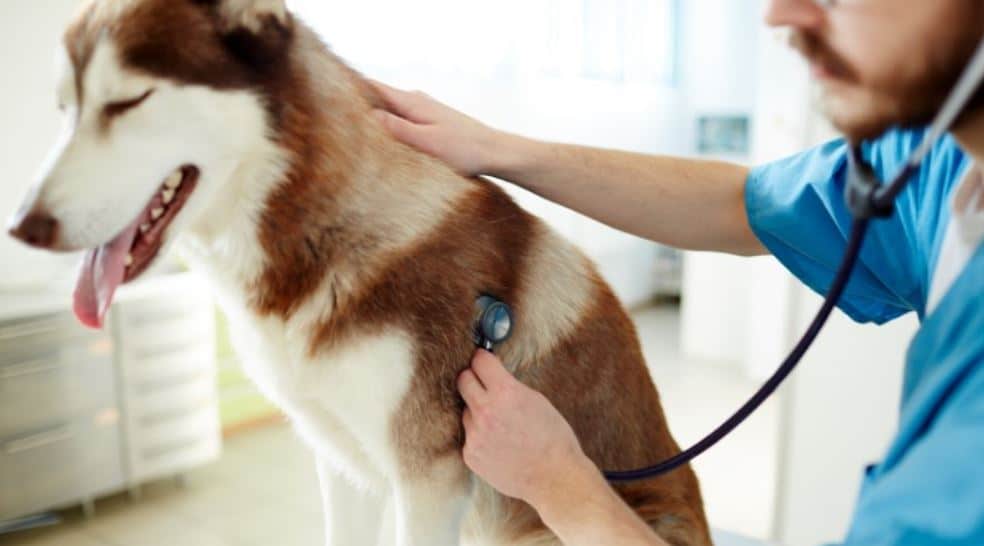Does your dog seem stiff when they get up after sitting for a period of time? Do you have a large dog that is prone to joint issues later in life? As pets age, their bodies change and are not as nimble as they once were. Unfortunately, running after a squirrel or hopping up onto a perch often becomes more of a struggle.
According to the Arthritis Foundation, approximately 20% of all dogs in the United States suffer from arthritis. If your dog is seven years old or more, there’s a 65% chance they’re suffering from the disease. For cats, it’s even worse. Around 33% of cats of all ages and 90% of cats over 12 years of age have arthritis.
It’s a sad reality that many pet owners are not aware of the pain their furry friends are forced to endure. It’s important to understand how a pet’s joints are affected and what you can do to help.
What are the symptoms of arthritis in pets?
Just like humans, there are some signs and symptoms you can watch for if you think your pet may have arthritis. Your pet may not exhibit signs of arthritis in its early stages, but will eventually get more symptomatic over time. Some pets are more tolerable than others. Cats seem to endure chronic pain and exhibit fewer symptoms than dogs. Symptoms of arthritis in cats or dogs may include:
- Legs give out while walking
- Swollen joints
- An overall decrease in activity or increase in stillness
- Difficulty moving into the sitting or standing position
- A popping or cracking when they move their joints
- Licking the joint area frequently
- Leg muscles looking thinner
- Unusual weight gain from being sedentary
- Unwillingness to walk or climb stairs
- Discomfort when handling them in a certain position or manner
One of the most common signs of arthritis in dogs and cats is decreased mobility and increased stillness. Pets may snap or growl at you when you pick them up or handle them in a certain way. It’s easy to miss the early signs of arthritis, so don’t be too hard on yourself if you have. Some pets don’t exhibit pain as much as you would think.
If your dog doesn’t want to go on their daily walk anymore or if your cat isn’t using their climbing tower as much as they once did, they may have arthritis. It’s important to consult your vet as soon as you notice any of the above signs or symptoms.
While there is no cure for canine arthritis, some supplements have shown significant efficacy in prevention, as well as pain management.
Do joint supplements for dogs and cats work?
Like all supplements used to treat various conditions in both humans and pets, sometimes they work and sometimes they don’t. Joint supplements for dogs are a part of a 636 million dollar industry, but are they worth the hype?
Some supplements promising to cure your pet’s ailments are scams; however, joint supplements may be a good preventative care and pain management tool. If you’re wondering how to find the best joint supplements for dogs or cats, you’ve come to the right place.
What are the best joint supplements for dogs or cats?
There are a few different kinds of joint supplements for dogs and cats, so it can be confusing when you’re looking for them. The best way to determine the best joint supplements for dogs is to ask your veterinarian for their recommendation. However, if you’re like me and want to be prepared before you go into the vet’s office, there are a few joint supplement options you can inquire about:
- Glucosamine
- Chondroitin
- Methylsulfonylmethane (MSM)
- Omega-3 fatty acids
In addition, these come in various forms. You’ll have to do a trial and error to see which ones are easiest for your pet to take. There are liquid gels, oils, tablets, and capsules that can be given to your pet by itself or mixed in with their daily feast.
What is glucosamine?
Glucosamine is a natural compound found within the cartilage of your joints. Cartilage is the tough tissue that cushions joints as you move and walk around. Glucosamine for dogs is very similar to the one humans may take for the same issues: to prevent cartilage from breaking down as you age.
In supplement form, glucosamine is harvested from shellfish or made in a lab. There are different kinds of glucosamine: glucosamine sulfate, glucosamine hydrochloride, and N-acetyl glucosamine. These supplements are not considered interchangeable and are utilized for various conditions. It’s important to have your vet prescribe glucosamine, so you are not choosing the wrong supplement. It is never safe to self-diagnose or prescribe.
Glucosamine is a natural cartilage building block. As humans and pets age, the body loses this cartilage much faster than it can be produced. This is why people turn to glucosamine and other joint supplements to help their pet’s bodies replenish glucosamine storage.
What can glucosamine be used for?
Glucosamine joint supplements for dogs are typically prescribed to help alleviate the symptoms of joint deterioration by boosting the repair of damaged cartilage, specifically articular cartilage. This specific cartilage is the moist, spongy material that is located between the joints and acts as a cushion when you walk or move around.
Some basic uses of glucosamine are to:
- Prevent the onset of arthritis or osteoarthritis
- Decrease the likelihood of glaucoma
- Aid in severe weight loss
- Reduce certain, specific bladder conditions
- Decrease joint and back pain
Are all glucosamine supplements the same?
No. You have to be very careful when purchasing glucosamine, as well as other joint supplements for dogs. Some supplements, even from well-known companies, contain lead or low amounts of glucosamine.
Consult your vet before purchasing glucosamine and make sure to check that it was not sourced from China. Many supplements sourced from China are lower in concentration than what is advertised. They also may be made with low-quality ingredients.
Would a natural anti-inflammatory for dogs work?
In some cases, giving a natural anti-inflammatory for dogs could work, unless their arthritis is severe. Before giving your dog any natural supplements, you must check with your vet to make sure they are safe for dogs to consume and won’t interfere with other medications your dog may be taking. Natural anti-inflammatory for dogs may include:
- Boswellia
- Yucca root
- Turmeric
- Nettle leaf
It’s important to ask your vet how much medication to give your dog before proceeding. Some natural anti-inflammatories for dogs are meant to be made into a paste, while others may be ingested. This is why it’s important to fully understand the natural product and its uses.
What can you give a dog for pain relief?
If you are looking for a safe pain reliever for your dog, there are many on the market; however, they are very different from the ones humans use. Just like glucosamine, dosages for dog NSAIDs are based on weight. You must consult your vet before giving your dog any pain relievers, natural or over-the-counter. Some commonly used NSAIDs for dogs include:
- Carprofen (Novox or Rimadyl)
- Deracoxib (Deramaxx)
- Firocoxib (Previcox)
- Meloxicam (Metacam)
- Acetaminophen (Tylenol)
Each of these is used for different ailments, so your vet must choose which ones will be best for joint-related pain.
What age do pets start to experience joint issues?
Your pet’s gender, breed, age, and weight will determine when they may start experiencing joint issues. However, it iscommon for pets to start exhibiting symptoms after the age of seven.
If you’re concerned your dog or cat may be experiencing joint pain or arthritis, consult your vet immediately. It is important tobe proactive about joint issues before they worsen.
Your dog counts on you to be proactive when it comes to their health. The best way to get ahead of joint conditions is to:
- Observe your dog’s behavior and movements.
- Consult your vet as soon as you think your pet may be experiencing pain.
- Exercise your dog regularly to avoid weight issues.
- Feed your pet a healthy, balanced diet.
- Avoid having your pet jump from a high place such as the car or bed.
- Ask your vet if you should be adding glucosamine to their diet.
At Prudent Pet, we believe proactive, preventative care is the best kind of care for your furry friend. Don’t wait until your pet is in the end stages of arthritis to develop healthy habits. Visits to the vet for arthritis or joint problems can start to add up.
Enroll your pal in dog or cat insurance to ensure they will be healthy and happy. Click here to get a FREE, no-commitment quote.
The information provided on this website is made available for educational purposes only. It should in no way be substituted for professional veterinary assessment of each individual patient by a suitably qualified veterinary surgeon or veterinarian.











